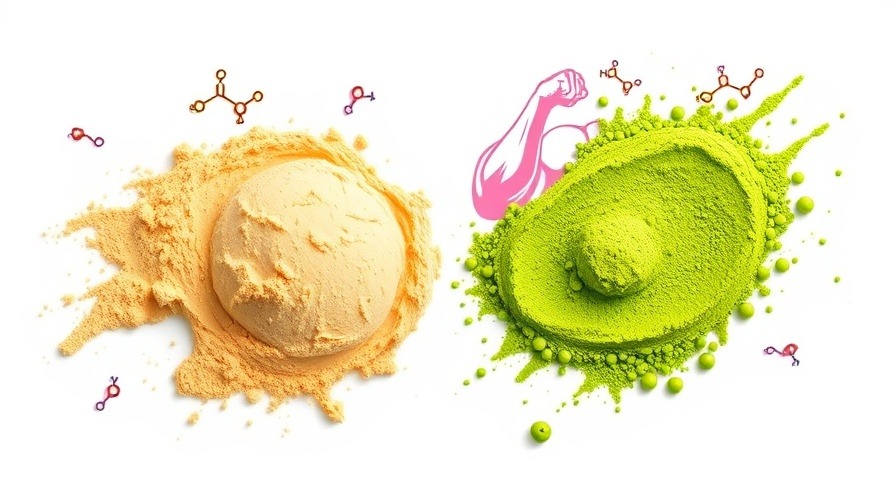
Can Ginger and Turmeric Help Ease Pain and Discomfort?
As parents and adults concerned with health and wellness navigate the complexities of modern medicine, natural remedies like ginger and turmeric present appealing alternatives that have stood the test of time. These two powerful roots, long celebrated in both traditional medicine and emerging modern research, have a lot to offer when it comes to managing pain and inflammation. Let’s delve into the science behind ginger and turmeric, focusing on their potential benefits and practical applications.
In the video 'Can Ginger and Turmeric Really Reduce Pain? Here’s What Science Says!', the discussion dives into the healing properties of these roots, exploring key insights that sparked deeper analysis on our end.
The Power of Ginger: Nature’s Nausea Remedy
Ginger, known for its unique flavor and versatility in cooking, holds a potent compound called gingerol. This compound is celebrated for its anti-inflammatory and antioxidant properties, making ginger an effective natural remedy for various forms of sickness. From morning motion sickness to nausea induced by chemotherapy, ginger has been shown to soothe upset stomachs effectively.
But ginger isn’t just for easing tummy troubles. Research suggests that daily ginger supplements may relieve muscle pain post-exercise, making it a natural choice for athletes and active individuals alike. Additionally, ginger can enhance digestion by facilitating the stomach's emptying process, alleviating bloating and indigestion along the way.
To integrate ginger into your diet, consider grating fresh ginger into hot water for a comforting tea or blending it into smoothies. Chewing on candied ginger can also be a convenient solution during your travels to keep nausea at bay.
Turmeric: The Anti-Inflammatory Powerhouse
While ginger takes the spotlight for nausea, turmeric is often hailed as a superstar in the anti-inflammatory arena. The compound curcumin, found in turmeric, offers impressive health benefits, particularly in managing joint pain. Studies indicate that curcumin can alleviate symptoms in individuals with arthritis while providing fewer side effects than traditional non-steroidal anti-inflammatory drugs (NSAIDs).
Moreover, curcumin's immunomodulatory effects can help regulate immune responses, which is particularly significant during cold and flu seasons. Although turmeric won’t cure these ailments outright, it can provide relief from throat irritation and general discomfort associated with viral infections.
To maximize curcumin’s absorption, it’s essential to pair it with black pepper, which contains piperine, or fat like coconut milk. You can easily add turmeric to soups, curries, or golden milk to enhance your meals while reaping its health benefits. Alternatively, consider supplements that combine curcumin and piperine for optimal effects.
Understanding the Risks and Recommendations
While both ginger and turmeric are generally safe when consumed in typical food amounts, caution is still warranted. High doses of ginger may lead to heartburn or interfere with blood thinners, while excessive turmeric can upset the stomach or have adverse effects when mixed with specific medications, particularly those for blood thinners or diabetes.
As with any supplement, consulting a healthcare provider before starting ginger or turmeric in concentrated forms is crucial—especially for those on existing medication regimens.
Making Ginger and Turmeric Part of Your Wellness Routine
In a world where quick fixes are often sought for ailments, the power of ginger and turmeric shines as safe, natural tools that can help combat pain, reduce inflammation, and support immune health. These roots should not be considered magical cures but rather a balanced addition to a holistic approach to wellness.
For parents juggling health concerns, integrating ginger and turmeric into family meals can boost not only taste but also health benefits. Just a little can go a long way in fostering better health at home.
As we continue to explore natural remedies and their place in medical treatment, ginger and turmeric remind us that sometimes, solutions lie within our own kitchens. Their historical significance combined with modern scientific validation makes them worthy of consideration in anyone's dietary regimen.
Call to Action: Try It Today!
If you’re curious about how ginger and turmeric can enhance your well-being, why not give them a try? Start by adding them to your meals or consider supplements if recommended by your healthcare provider. Incorporating these ingredients into your life can be an empowering step towards better health.
Disclaimer: The information provided on this website is for general informational purposes only and should not be considered medical advice, diagnosis, or treatment. Always consult a qualified healthcare professional before making any decisions or taking actions related to your health, including but not limited to medical conditions, treatments, diets, supplements, or exercise programs. The content on this site is not intended to replace professional medical guidance. The website and its authors are not responsible for any actions taken based on the information provided.
 Add Row
Add Row  Add
Add 




 Add Row
Add Row  Add
Add 

Write A Comment